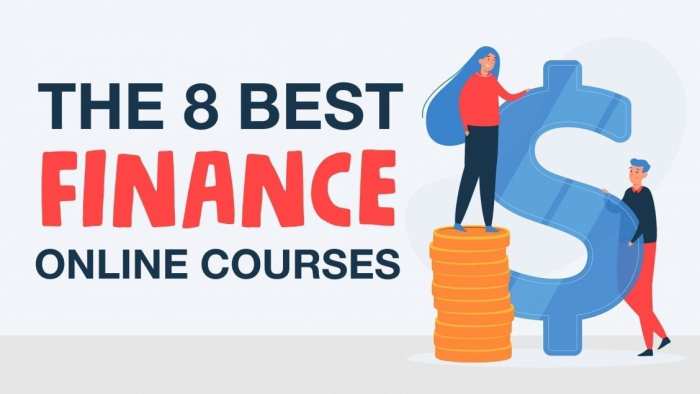Online financial courses set the stage for this enthralling narrative, offering readers a glimpse into a story rich in detail and brimming with originality from the outset. Dive into the world of finance with just a click, as we explore the benefits, selection tips, curriculum insights, interactive tools, and global accessibility of these courses.
Introduction to Online Financial Courses
Taking online financial courses comes with a variety of benefits that can help individuals enhance their financial knowledge and skills from the comfort of their own home. These courses provide flexibility in scheduling, accessibility to a wide range of topics, and the opportunity to learn at your own pace.
Types of Financial Courses Available Online
- Personal Finance Management
- Investing and Stock Market Fundamentals
- Financial Planning and Wealth Management
- Budgeting and Saving Strategies
How Online Financial Courses Differ from Traditional In-Person Courses
Online financial courses differ from traditional in-person courses in various ways. One key difference is the flexibility of online courses, allowing students to access materials and lectures at any time and from anywhere. Additionally, online courses often offer a wider range of topics and resources compared to traditional courses. Another difference is the opportunity for more personalized learning experiences through online platforms, where students can interact with instructors and peers through virtual discussions and forums.
Choosing the Right Online Financial Course
When it comes to selecting an online financial course, it’s crucial to do your research and choose a reputable platform that meets your needs. Here are some tips to help you make the right choice:
Comparison of Different Platforms
- Look for platforms that offer courses from well-known financial institutions or industry experts.
- Check reviews and ratings from past students to get an idea of the course quality and instructor effectiveness.
- Consider the course content and whether it aligns with your learning goals and interests.
Importance of Accreditation and Certification
Accreditation and certification play a crucial role in ensuring the credibility and recognition of the online financial course you choose. Here’s why it matters:
- Accreditation indicates that the course meets certain quality standards set by accrediting bodies.
- Certification adds value to your resume and demonstrates your commitment to professional development in the financial field.
- Employers often prefer candidates with accredited and certified training, giving you a competitive edge in the job market.
Course Curriculum and Content
Online financial courses cover a wide range of topics to equip students with practical skills and knowledge in managing finances effectively.
Typical Topics Covered in Online Financial Courses
- Introduction to Financial Management
- Financial Analysis and Reporting
- Investment Strategies
- Budgeting and Forecasting
- Risk Management
- Personal Finance
- Understanding Taxes
How Online Courses Teach Practical Financial Skills
Online financial courses often include interactive modules, case studies, and simulations to help students apply theoretical knowledge to real-life scenarios. This hands-on approach allows learners to develop critical thinking and problem-solving skills in financial decision-making.
Case Studies or Real-Life Examples in Online Financial Courses
Online financial courses frequently incorporate case studies and real-life examples to illustrate key concepts and principles. By analyzing these scenarios, students can gain a deeper understanding of how financial theories are applied in practice and learn from the successes and failures of others in the field.
Interactive Learning Tools and Resources
In online financial courses, interactive learning tools and resources play a crucial role in enhancing the overall learning experience for students. These tools not only help in understanding complex financial concepts but also provide a practical approach to applying theoretical knowledge in real-world scenarios.
Simulations and Quizzes
Simulations and quizzes are commonly used in online financial courses to engage students and assess their understanding of the material. Simulations allow students to make financial decisions in a risk-free environment, helping them understand the consequences of their choices. Quizzes, on the other hand, test the knowledge acquired during the course and provide instant feedback to students, enabling them to identify areas that need improvement.
Discussion Forums and Peer-to-Peer Interaction
Discussion forums and peer-to-peer interaction are essential components of online financial courses as they facilitate collaboration and knowledge sharing among students. Discussion forums enable students to ask questions, share insights, and engage in meaningful discussions with their peers and instructors. Peer-to-peer interaction allows students to learn from each other’s experiences, perspectives, and approaches to financial problems, enhancing their overall learning outcomes.
Flexibility and Accessibility

Online financial courses offer a level of flexibility that traditional classroom settings simply cannot match. Students have the freedom to create their own study schedules, allowing them to balance their coursework with other commitments such as work or family responsibilities.
Furthermore, online courses cater to different learning styles by providing a variety of resources and interactive tools. Visual learners can benefit from video lectures and infographics, while auditory learners may prefer podcasts or recorded lectures. This flexibility ensures that students can engage with the material in a way that best suits their individual needs.
Global Accessibility
- Online financial courses are accessible to a global audience, breaking down geographical barriers that may have otherwise prevented individuals from participating in traditional classroom settings.
- Students from different countries and time zones can enroll in courses without having to travel, making education more accessible to those who may not have the means to study abroad.
- Additionally, online courses often offer translated materials and subtitles, further enhancing accessibility for non-native English speakers.
